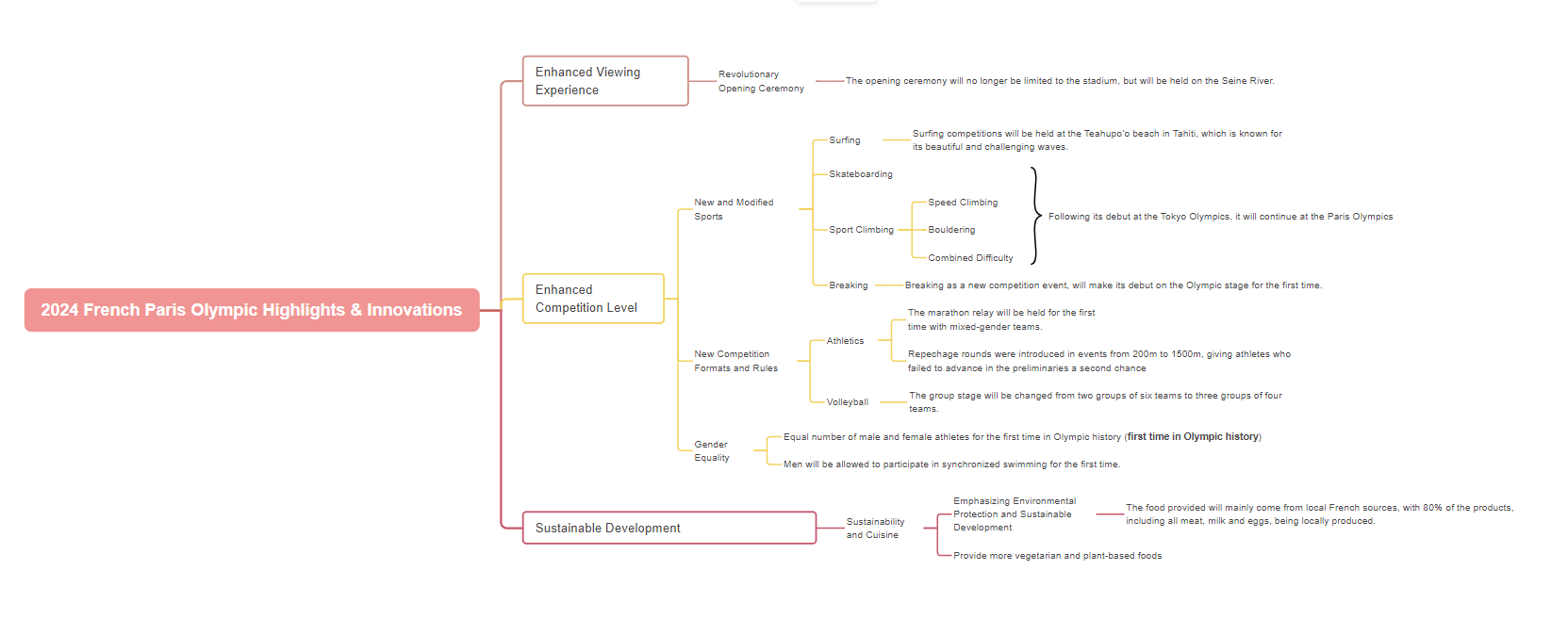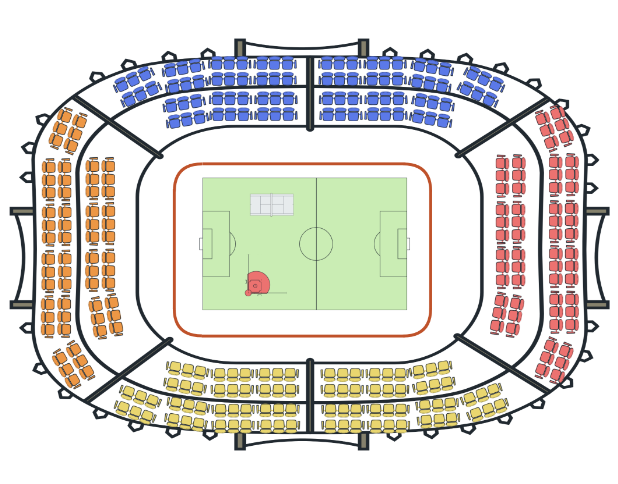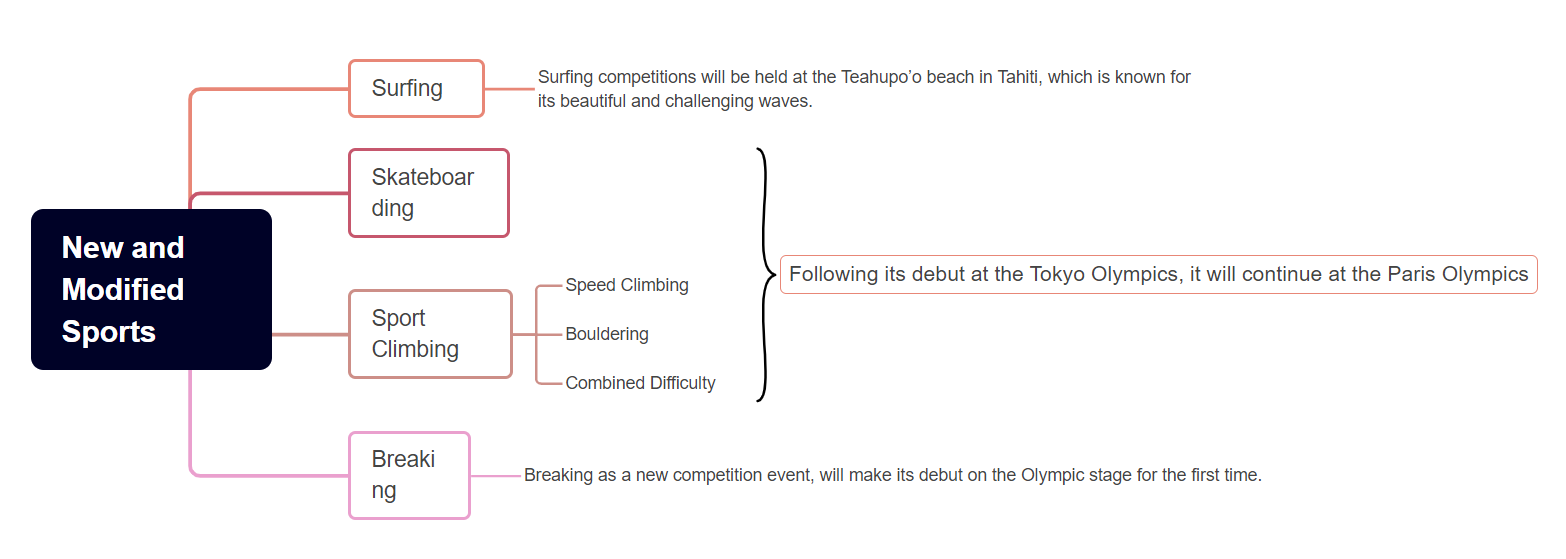

As one of the most iconic sports events in history, the Olympic Games always bring endless surprises and emotions to people. However, there are some lesser known details about the Paris Olympics that are worth exploring. This article will delve into various aspects of the Paris Olympics, including its historical background, new events, sustainable development initiatives, technological applications, cultural activities, and emphasis on national participation and diversity. This article will delve into various aspects of the Paris Olympics, including its historical background, new events, sustainable development initiatives, technological applications, cultural activities, and emphasis on national participation and diversity.
The simplified version of the mind map in this article is shown in the following figure👇

The 2024 Paris Olympics is the 33rd Summer Olympic Games and will be held from July 26 to August 11, 2024. This is not only a grand event in the sports industry, but also a platform for global cultural exchange. Paris will welcome athletes and spectators from around the world with its rich history and modern facilities. The main venues include the Paris Olympic Stadium, the Paris Arena in Boulogne Billancourt, and the Parc des Princes. These venues not only have modern facilities, but also integrate France's unique architectural style and cultural elements.
1.1 The Origin of Modern Olympic Games
The modern Olympic Games were revived by Baron Pierre de Coubertin of France in 1894 and first held in Athens, Greece, in 1896. Since then, the Olympic Games have been held every four years, becoming one of the most influential sports events in the world. Paris, as an important city for the Olympic Games, holds a special position in the history of the Olympics. The 2024 Olympics will coincide with the centenary of the last time Paris hosted the Olympics, making Paris the second city after London to host the Summer Olympics three times.
1.2 The symbolic significance of the Paris Olympics
The Paris 2024 Olympics is not only a sporting event, but also an opportunity to showcase French culture and innovative spirit. Paris is a world-renowned cultural and artistic capital, and this Olympic Games will fully showcase France's unique charm through activities such as the opening and closing ceremonies.
The opening ceremony of the Paris Olympics will be held on July 26th along the Seine River in the center of Paris (if the safety risk of the opening ceremony is too high, the number of people may be limited and the opening ceremony will be held at Trocad é ro Square or Stade de France). This is the first time that the opening ceremony will be held in an open space outside of traditional sports venues, and the closing ceremony will be held at the Grand Est in France on August 11th. The date and schedule of the competition have been announced, with important events including track and field finals, swimming competitions, basketball finals, etc. In addition, there are a series of cultural festivals and events showcasing France's rich cultural heritage and contemporary art.
Traditional Olympic Opening Ceremony Venue - Gymnasium:

More than 200 countries and regions are expected to participate in the Paris Olympics. The number of participants from each country is determined based on their strength and qualifying results in various sports, including some athletes who have a high reputation on the international stage. For example, the United States will send top athletes in athletics and swimming, while China will focus on billiards and badminton.

New Competition Formats and Rules
This Olympic Games will include 32 major events and 329 minor events, covering traditional events such as track and field, swimming, basketball, and football. At the same time, some modern and dynamic events have been added, attracting more attention from young audiences.

New and Modified Sports
3.1 Skateboards
After its debut at the Tokyo Olympics, skateboarding continued to be a major highlight of the Paris Olympics. Skateboarding is not only a recreational activity for young people, but also an extreme sport that tests athletes' technology and courage. The Paris city government plans to install skateboard facilities in urban parks and public places.
3.2 Surfing
Although Paris is not a surfing destination, the competition will be held on the island of Tahiti in French Polynesia, providing viewers with a unique sea sports experience. Surfing sports demonstrate athletes' ability to regulate and compete in natural environments. The Tahiti Islands are an overseas territory of France, located in the vast South Pacific Ocean. Due to their remote location, they were one of the last land areas where humans settled. In 'The Moon and Sixpence', the Tahiti Islands are a dreamlike place that the protagonist dreams of, and also a 'tropical paradise' in the minds of tourists worldwide.
The distance between Tahiti Islands and Paris is close to 16000 kilometers, which will set a record for the longest distance between two competition venues in Olympic history.
3.3 Rock Climbing
Rock climbing, as an Olympic sport, has attracted a lot of attention since its debut at the 2020 Tokyo Olympics. The Paris Olympics will continue to showcase this highly entertaining sport. The addition of rock climbing has attracted more outdoor enthusiasts to pay attention to the Olympics. The rock climbing competition of the Paris Olympics will be held in temporary facilities in the city center, making it easier for more spectators to watch.
At the 2024 Paris Olympics, rock climbing will include three competitions: speed climbing, difficulty climbing, and rock climbing. Speed climbing requires athletes to reach the top in the shortest possible time; Difficulty climbing refers to climbing as high as possible along longer routes; Rock climbing involves climbing along short and complex routes without the need for safety ropes. Each competition is scored separately, and the final ranking is based on the comprehensive scores of three items.
3.4 Breakdancing
Breakdancing is a dance form originating from street culture that has attracted a large number of young people with its high difficulty movements and unique style. The Paris Olympics included breakdancing as an official competition event, enriching the cultural connotation of the Olympics and promoting exchange and integration between different cultures.
The Paris Olympics strives to become one of the most environmentally friendly Olympic Games in history, embodying the concept of sustainable development from venue construction to transportation.

Sustaina bility and Cuisine
4.1 Low carbon venue construction
Most of the competition venues are existing buildings that only need to be renovated to be usable. For example, the famous Stade de France will host events such as athletics and rugby, while the Paris World Expo will be used for judo and wrestling competitions. New venues such as the Olympic Village in Saint Denis have also adopted environmental data and renewable energy.
4.2 Green Transportation
The Paris municipal government encourages audiences and participants to use green transportation channels such as public transportation, bicycles, and walking. The government plans to provide free or discounted public transportation services during the competition period and set up temporary bicycle parking spots throughout the city.
4.3 Resource Reuse
In order to reduce waste, the organizers of the Paris Olympics plan to convert many temporary facilities into permanent community resources after the competition ends. The construction of all venues and facilities will comply with strict environmental standards to ensure that these facilities can continue to serve the community and environment after the event.
The Paris Olympics is not only a sports event, but also a showcase of the integration of technology and culture. Through innovative technology and rich cultural activities, the Paris Olympics will bring a brand new experience to global audiences.
5.1 Application of Smart Technology
The Paris Olympics will extensively utilize AI technology to improve efficiency in event management, security, and audience services. For example, the smart ticketing system will effectively prevent ticket scalping, while the smart security system can monitor the situation of the competition in real time to ensure the safety of the event. In addition, Paris also plans to use smart navigation and voice assistants to provide convenient venue guidance and information consultation services for audiences.
5.2 Virtual Reality and Augmented Reality
Virtual reality (VR) and augmented reality (AR) technologies will be widely applied in the Paris Olympics. Viewers can immerse themselves in the tense atmosphere of the competition through VR devices; AR technology can provide real-time data and analysis during the competition process.
The Paris Olympics advocates for universal participation, which is not only reflected in sports competitions, but also widely incorporates public opinions in the organization and preparation process. The organizing committee collected suggestions from the public on the closing ceremony and volunteer services through online voting and community discussions.
6.1 Volunteer Service
The Paris Olympics is expected to recruit tens of thousands of volunteers who will be responsible for venue services, audience guidance, language translation, and other related tasks. The organizing committee will provide comprehensive training and rich welfare benefits, so that every volunteer can achieve growth and happiness in the Olympic Games.
6.2 Community Activities
During the Paris Olympics, the municipal government will organize various community activities, including community sports events, cultural exchange activities, and public welfare projects, to enhance community cohesion and promote communication and cooperation between different groups.
6.3 Public Participation Platform
In order to involve more people in the preparation and organization of the Olympic Games, the Paris Olympic Organizing Committee has established an online public participation platform. Through this platform, the public can submit suggestions, participate in voting, register for volunteer services, and more.
The Paris Olympics is committed to showcasing inclusivity and diversity, which is reflected not only in the design of competition events, but also in the diversity of participating athletes and audience groups.
7.1 Gender Equality
This Olympic Games will achieve a complete balance in the proportion of male and female athletes, with 50% male and 50% female athletes participating for the first time. In addition, the Paris Olympics also plans to achieve gender equality in prize money, promotion, and resource allocation for various events.

Gender Equality
7.2 Parallel Paralympic Games
The preparation for the Paralympic Games is synchronized with the Olympic Games to ensure that disabled athletes receive equal attention and support during the competition. The Paris Paralympic Games will set up more competition events and provide accessible venues and facilities.
7.3 Cultural Diversity
The Paris Olympics will promote exchange and integration between different cultures through various activities and events. The organizing committee invites artists, musicians, and performers from around the world to host a series of cultural events, providing diverse cultural experiences for audiences worldwide. The opening and closing ceremonies will fully showcase France's cultural and artistic achievements, and multiple cultural institutions in Paris will hold special exhibitions and events.
The 2024 Paris Olympics is not only a sporting event, but also a grand gathering of culture, technology, and sustainable development. Through innovative event arrangements, rich cultural activities, and extensive social participation, Paris will showcase a modern, diverse, and inclusive city image to the world. All participants, whether athletes, spectators or volunteers, will have an unforgettable experience in this grand event and feel the charm of the Olympic spirit.
The above articles are accompanied by images from the ProcessOn template community. ProcessOn, as a powerful professional drawing tool, supports online editing of various graphics such as flowcharts, mind maps, prototype diagrams, UML, network topology diagrams, etc. Users can create new content from scratch and easily edit and modify existing drawing frameworks and case templates, with simple and easy-to-use operations.